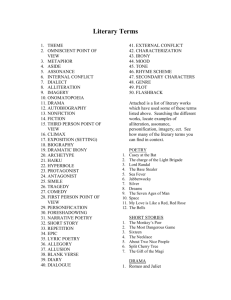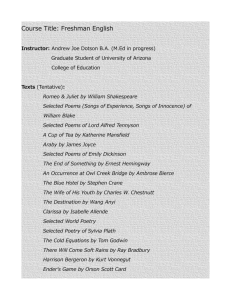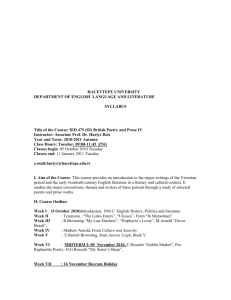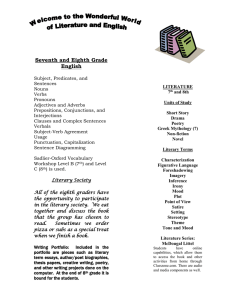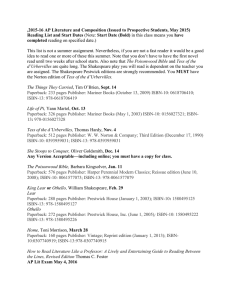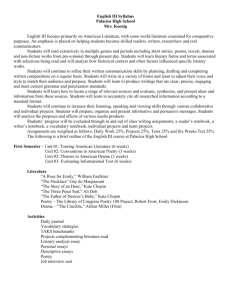Unit 1: Foundations of English Literature (3 weeks)
advertisement
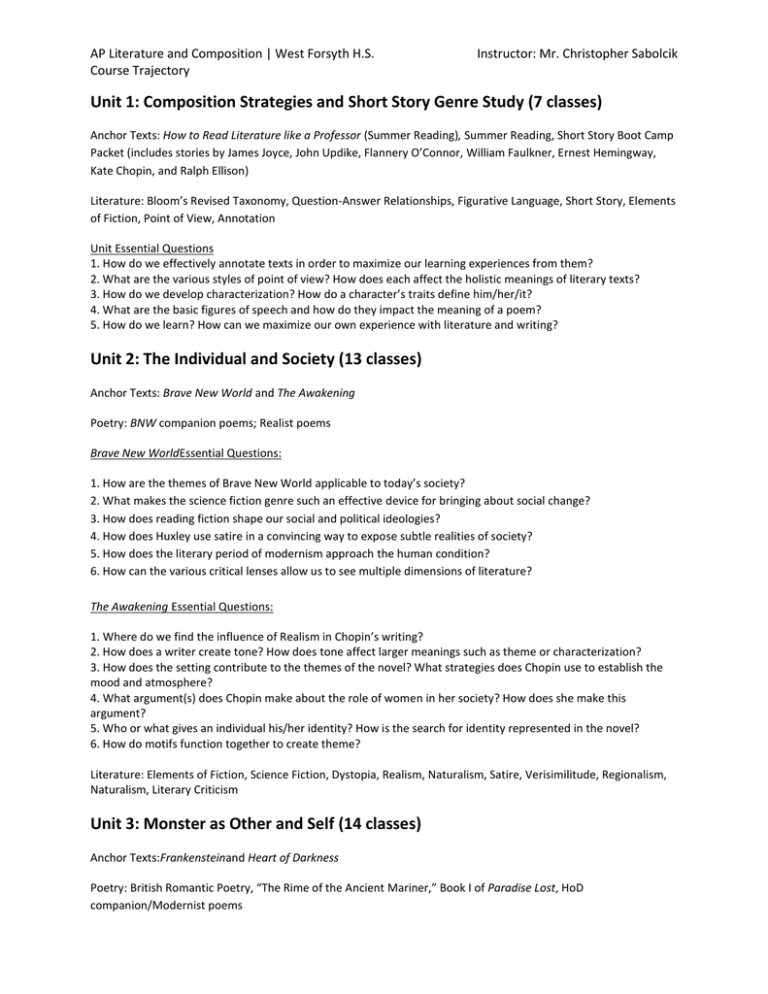
AP Literature and Composition | West Forsyth H.S. Course Trajectory Instructor: Mr. Christopher Sabolcik Unit 1: Composition Strategies and Short Story Genre Study (7 classes) Anchor Texts: How to Read Literature like a Professor (Summer Reading), Summer Reading, Short Story Boot Camp Packet (includes stories by James Joyce, John Updike, Flannery O’Connor, William Faulkner, Ernest Hemingway, Kate Chopin, and Ralph Ellison) Literature: Bloom’s Revised Taxonomy, Question-Answer Relationships, Figurative Language, Short Story, Elements of Fiction, Point of View, Annotation Unit Essential Questions 1. How do we effectively annotate texts in order to maximize our learning experiences from them? 2. What are the various styles of point of view? How does each affect the holistic meanings of literary texts? 3. How do we develop characterization? How do a character’s traits define him/her/it? 4. What are the basic figures of speech and how do they impact the meaning of a poem? 5. How do we learn? How can we maximize our own experience with literature and writing? Unit 2: The Individual and Society (13 classes) Anchor Texts: Brave New World and The Awakening Poetry: BNW companion poems; Realist poems Brave New WorldEssential Questions: 1. How are the themes of Brave New World applicable to today’s society? 2. What makes the science fiction genre such an effective device for bringing about social change? 3. How does reading fiction shape our social and political ideologies? 4. How does Huxley use satire in a convincing way to expose subtle realities of society? 5. How does the literary period of modernism approach the human condition? 6. How can the various critical lenses allow us to see multiple dimensions of literature? The Awakening Essential Questions: 1. Where do we find the influence of Realism in Chopin’s writing? 2. How does a writer create tone? How does tone affect larger meanings such as theme or characterization? 3. How does the setting contribute to the themes of the novel? What strategies does Chopin use to establish the mood and atmosphere? 4. What argument(s) does Chopin make about the role of women in her society? How does she make this argument? 5. Who or what gives an individual his/her identity? How is the search for identity represented in the novel? 6. How do motifs function together to create theme? Literature: Elements of Fiction, Science Fiction, Dystopia, Realism, Naturalism, Satire, Verisimilitude, Regionalism, Naturalism, Literary Criticism Unit 3: Monster as Other and Self (14 classes) Anchor Texts:Frankensteinand Heart of Darkness Poetry: British Romantic Poetry, “The Rime of the Ancient Mariner,” Book I of Paradise Lost, HoD companion/Modernist poems AP Literature and Composition | Mr. Christopher Sabolcik | West Forsyth High School Frankenstein Essential Questions: 1. How does the literary period of Romanticism attempt to frame the question of “what is the human condition”? 2. How does our encounter with “the Other” influence our psyche? 3. To what extent is monstrosity socially constructed? To what extent is monstrosity a product of nature? 4. How does the narrative structure impact the meaning of the text? 5. To what extent is science at fault for the events in Shelley’s novel? How does that compare to Huxley’s novel? Or, at what point do we consider the result of technological integration in our bodies to be non-human? 6. What is the role of personal responsibility and compassion in the novel? Heart of Darkness Essential Questions: 1. How does the novella serve as a bridge between the 19th and 20th centuries in terms of literary style and theme? 2. How does geography establish narrative structure, psychological stability, and our conception of the Other? 3. To what extent is this novella racist? What does this novella tell us about Western views of imperialism at the fin-de-siècle? 4. How does Conrad use literary elements to create “darkness”? 5. Is the novel's formal experimentation a tool for critical inquiry that questions dominant ideologies and challenges conventional assumptions, or is Conrad's preoccupation with innovations in narrative form a deflection from political questioning and historical analysis--an attempt to cover up real atrocities with fanciful artistic structures? Literature: Sound Devices, Romanticism, Gothicism, Colonialism, Frame Narrative, Unreliable Narrator, Sublime, Allusion, Epistolary Unit 4: Comedy, Satire, and Manners (Winter Break) Anchor Texts:The Importance of Being EarnestandThe Rape of the Lock The Importance of Being Earnest Essential Questions: 1. What comic devices are available to a dramatist? To what extent is it a play for 'serious people'? 2. How does Wilde use literary devices in order to construct his argument? 3. What is a comedy of manners? What aspects of society in Victorian England are being criticized in the play? 4. How does Wilde the dramatist build characterization? What are the various types of character that are used? The Rape of the Lock Essential Questions: 1. What are the literary elements of satire? What makes good satire good? 2. How is the Neoclassical/Augustan period a reflection of social, political, and religious strife occurring in Britain during this time? 3. How can poetic elements be used for a rhetorical purpose? 4. In what ways does the Neoclassical period establish intellectual paradigms that will ultimately be negated by Romanticism? Literature: Neoclassicism, Victorianism, Comedy, Sound Devices, Parody, Deus Ex Machina Unit 5:Tragedy, Absurdity, and Ideology (11 classes) Anchor Texts:Hamlet and Rosencrantz and Guildenstern are Dead Poetry: Renaissance Poetry, Postmodern Poetry AP Literature and Composition | Mr. Christopher Sabolcik | West Forsyth High School Hamlet Essential Questions: 1. How does the Enlightenment period of literature attempt to portray the human condition? 2. What are the essential characteristics of tragedy? How does the genre provide a sense of morality? 3. How do humans cope with conflicting elements within their personalities and psyches? 4. How do the minor characters in the play contribute to its actions and themes? 5. What is the role of family loyalty in Hamlet’s quest for revenge? 6. Does Hamlet cause his own downfall? Or did a lust for power lead to his demise? Rosencrantz and Guildenstern are Dead Essential Questions: 1.How does R and G are Dead illustrate existential ideas regarding fate, free will, and the purpose of our existence? 2. What is the Theatre of the Absurd and how did these writers seek to represent the human condition? 3. How do the characters in the play create meaning and identity in a chaotic and unknowable universe? 4. In what ways is R and G are Dead a continuation of Shakespeare’s ideas? In what ways does it depart? How does the intertextual relationship function in the play? Literature: Aristotelian Tragedy, Absurdism, Tone, Renaissance Period, Character Unit 6: Search for Meaning (7 classes) Anchor Text: The Stranger, Kafka short stories TBD (“Before the Law”) Poetry: Modernist Poetry The Stranger Essential Questions 1. How does Camus manipulate language in order to reflect the alienated psyche of Meursault? 2. What is Existentialism? What is Absurdism? How do these movements reflect the ethos of postwar Europe? 3. What is the relationship between the individual and the moral structures that surround her? 4. Is justice possible in an absurd world? How does Camus address the question of justice? 5. How does a literary text change in translation? What factors influence the transference of meaning in foreign literature to our native tongue of English? Literature: Antihero, Modernism, Existentialism Unit 7: Family Feuds (13 classes) Anchor Texts:WutheringHeights and Their Eyes Were Watching God Poetry: Victorian Poetry, Harlem Renaissance Poetry WutheringHeights Essential Questions: 1. How do the Victorians approach the question of humanity and its characteristics? 2. How does Bronte frame the archetype of the villain? How is it different or similar to what we have encountered before? 3. To what extent are narrators reliable? How can we, as readers, know? How does the narrative structure limit or grant access to the truth of a text? 4. How does Bronte use literary devices to create dualisms that drive the dynamic plot? 5. How does class inform opportunities and attitudes in Victorian England? AP Literature and Composition | Mr. Christopher Sabolcik | West Forsyth High School 6. What is the tension between "nature" and "society" in the novel? Please note: Students will be expected to read Their Eyes Were Watching God and complete assignments over Spring Break Their Eyes Were Watching God Essential Questions: 1. How did the marginalized group of African American artists during the Harlem Renaissance attempt to portray their version of the human condition? 2. How can we use various lenses of critical theory to understand the novel? 3. What kinds of experiences lead to the discovery of self-identity in the novel? 4. How does Hurston use literary devices to create power dynamics between characters and social conventions? 5. What role does gender and class have in structuring relationships? Literature: Poetic Meter and Foot, Victorianism, Byronic Hero, Bildungsroman, Dialect, Harlem Renaissance Unit 8: Struggles with Self (Spring Break and 4 classes) Anchor Texts:Death of a Salesman Death of a Salesman Essential Questions: 1. Does the American Dream contradict American reality? 2. Do money and material goods define success? 3. Does society impact an individual’s ability to succeed? 4. Is Willy a victim of society’s consumerism or is he ultimately in control of his own destiny? 5. How is the American Dream characteristic of American ideals and philosophy? What are the differences between the materialistic and the idealistic values associated with the American Dream? Literature: Postmodernism Unit 9: Lasting Connections to Literature (Post- AP Exam) The Glass Menagerie, Film Criticism, and Poetry Recitation The Glass Menagerie Essential Questions 1. What are the dominant critical theories of film? How do we approach the hermeneutics of film? 2. How does a director “translate” a literary text to film? 3. What themes and ideas of the play can we apply to our lives? Favorite Poem Project (National Endowment for the Arts and the Library of Congress) & Poetry Recitation Creative Writing Seminars – Poetry and Flash Fiction AP Literature and Composition | Mr. Christopher Sabolcik | West Forsyth High School Suggested Editions of Novels/Plays Students are responsible for obtaining their own books in order to read and annotate. *Denotes the presence of the text in the public domain. These works can be found online for free or significantly more inexpensive on e-reader. If students choose to use e-readers, they will be expected to take notes by chapter in lieu of annotating a physical book. I highly recommend students purchase their own copies of books, as annotation is not only expected, but the process significantly improves comprehension and analytic engagement with the text. Brave New World* by Aldous Huxley Paperback: 288 pages Publisher: Harper Perennial Modern Classics; Reprint edition (October 17, 2006) ISBN-10: 0060850523 The Awakening* by Kate Chopin Series: Dover Thrift Editions Paperback: 128 pages Publisher: Dover Publications (November 4, 1993) ISBN-10: 0486277860 Frankenstein* by Mary Shelley Series: Dover Thrift Editions Paperback: 166 pages Publisher: Dover Publications; 1 edition (October 21, 1994) ISBN-10: 0486282112 Heart of Darkness* by Joseph Conrad Series: Dover Thrift Editions Paperback: 72 pages Publisher: Dover Publications; New edition (July 1, 1990) ISBN-10: 0486264645 The Importance of Being Earnest* by Oscar Wilde Paperback: 64 pages Publisher: Dover Publications; 1 edition (July 1, 1990) ISBN-10: 0486264785 Hamlet*by William Shakespeare Folger Shakespeare Edition Mass Market Paperback: 342 pages Publisher: Simon & Schuster; 1 edition (July 1, 2003) ISBN-10: 074347712X AP Literature and Composition | Mr. Christopher Sabolcik | West Forsyth High School Rosencrantz and Guildenstern are Dead by Tom Stoppard Paperback: 128 pages Publisher: Grove Press; Reprint edition (January 21, 1994) LISBN-10: 0802132758 The Stranger by Albert Camus Paperback: 123 pages Publisher: Vintage (March 13, 1989) Language: English ISBN-10: 0679720200 ISBN-13: 978-0679720201 Wuthering Heights* by Emily Bronte Series: Dover Thrift Editions Paperback: 256 pages Publisher: Dover Publications; New edition (September 24, 1996) ISBN-10: 0486292568 Their Eyes Were Watching God by Zora Neale Hurston Paperback: 256 pages Publisher: Harper Perennial Modern Classics; 1 edition (May 30, 2006) ISBN-10: 0061120065 AP Literature and Composition | Mr. Christopher Sabolcik | West Forsyth High School Aldous Huxley’s Brave New World Kate Chopin’s The Awakening Mary Shelley’s Frankenstein Joseph Conrad’s Heart of Darkness Oscar Wilde’s Importance of Being Earnest William Shakespeare’sHamlet Tom Stoppard’s Rosencrantz and Guildenstern are Dead Albert Camus’s The Stranger Emily Bronte’s Wuthering Heights Zora Neale Hurston’s Their Eyes Were Watching God Arthur Miller’s Death of a Salesman



